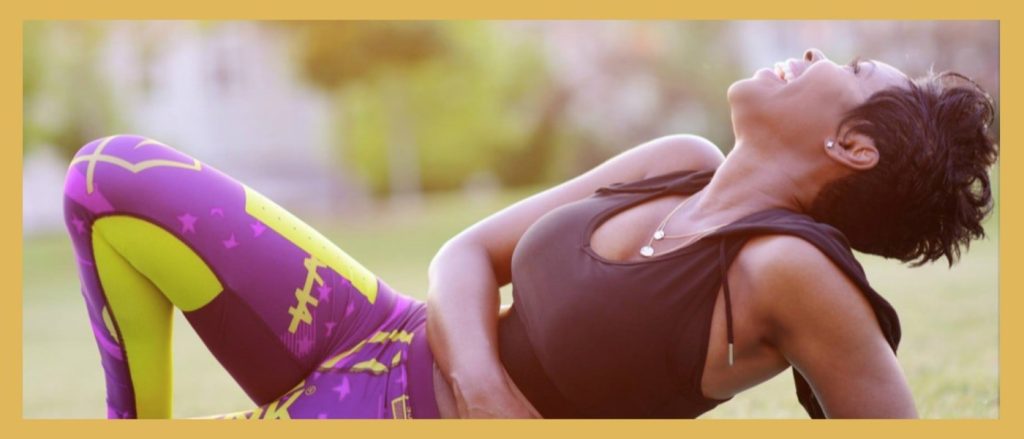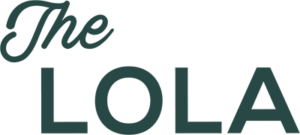Trinita Ervin Patton advocates for change in healthcare inequities by leveraging her connections and investing in her collaborations.
The Lola member, Trinita Ervin-Patton believes that solving issues surrounding health inequities is a grassroots movement. She has leveraged her connections and been intentional in her collaborations to create change in a monumental way. When she isn’t working on her innovative health education and wellness brand Ladybug for Girls®, you can find her running 5Ks!
 Trinita Ervin-Patton
Trinita Ervin-Patton
Location: Atlanta, GA
Age: 40-ish years
What I do: Founder/CEO of Ladybug for Girls®
Briefly describe who you are, what you do for work and for fun
I’m an athletic mom who loves running 5K’s for fun. I’m also a certified health coach who works exclusively with medical doctors, and the Founder/CEO of Ladybug for Girls®. Ladybug for Girls is an innovative health education and wellness brand created to inspire athletic girls to become Champions by putting the health of their Mind + Body first.
For the mind, I have authored the Mighty Habits® health education curriculum designed for the use of Ladybug for Girls. The curriculum is a one-of-a-kind, 21st century health education curricula that is backed by evidence-based behavioral health science and brain-body research. Packed with fun activities for girls, we focus on three fundamental life skills girls need to learn for success on and off the court: Eat Smarter, Move their Body, and have a Positive Mindset for optimal mental and emotional resilience.
For the body, we help active girls take their game to the next level. We make natural, high-performance bath, body, skin and hair care products with scented botanical blends formulated to protect teens and young girl’s delicate skin from exposure to the sun, environment, and vigorous athletic training allowing them to have fresher, more vibrant looking skin and rejuvenated bodies for peak performance.
Share your career story with us including anyone who inspired you along the way
Throughout my journey as a healthcare professional, I have been driven by the health inequities found in the current health system. Namely, I have always been passionate about improving the health literacy rates and healthcare access in my community because of the loss of my parents. I lost both of my parents at a very young age. My mom died when I was just two years old because of maternal health disparities, and my dad died of lung cancer because of tobacco use when I was sixteen. Both were preventable illnesses through health education and improved healthcare access for minorities. The healthcare field has been the most rewarding career path for me and I have been privileged to broaden my knowledge through years of studying and researching the correlation between social and behavioral health theories and chronic disease prevention.
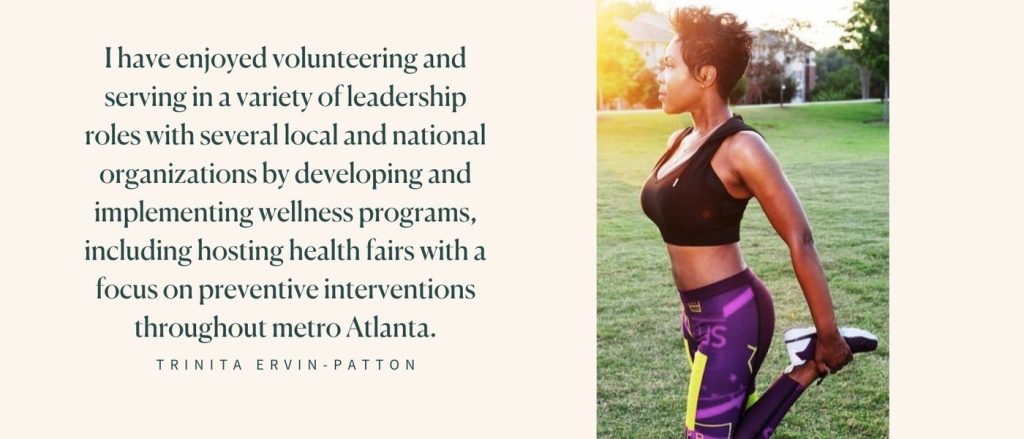
During these events and initiatives, we have provided general health education and support programs aimed at assisting marginalized populations with the adoptions of healthy lifestyle behaviors. This includes examining both the social determinants and structural factors that have led to systemic inequities at the individual level, in the community, and within our healthcare system.
These experiences have led me to my passion, which is providing health education to elementary school girls. As a parent, I wanted to make sure that I equipped my children with the tools to build healthy habits and develop the coping skills needed to get through their own emotional or social pressures early on during their childhood. But the social pressures of today are a stark difference from what I faced during my childhood years. I became alarmed and concerned about girls during my youngest daughter’s first year in middle school, sixth grade. It was probably the most challenging time for me as a parent. While she had the skills needed, her friends were dealing with some serious issues, such as emotional anxiety from social media, gender identity, and bullying. Our children today are facing some big conversations and social issues at the middle school level and even younger. Drawing from my experience in healthcare, I helped these girls navigate their issues to get the resources and interventions they desperately needed. One day my daughter asked me a very profound question, “how can I help other girls?”
So, inspired by lessons learned from my dad such as cooking and gardening and sparked by the loss of my own parents, I embarked on a new quest to figure out how I could apply the knowledge and skills I had learned to help other youth. I began by volunteering at the Clarkston Community Center, which serves the refugee population in Clarkston. Clarkston is one of America’s most diverse communities. I started with twelve Liberian refugee girls and just focused on what I already knew as far as eating healthy, being physically active and gardening. These simple intervention strategies led to the Center’s leadership requesting that I teach for the duration of their programming at the center. However, once I introduced the girls to sports, I found that they never imagined that they could be physically active or involved in sports which were male-dominated in their homeland. Nor were they emotionally prepared to deal with the complex social-emotional dynamics of competitive sports. It was during this time that I noticed the lack of resources available for the health and emotional development of children, and disproportionately for girls, in the health system.
After researching health behavior data on adolescents, I realized that there are some huge gender gaps and inequities in girl’s health which leads to their increased childhood obesity rates, their poor emotional well-being, a decrease in physical activities, and their lack of participation in sports. This led me to launch a health and wellness brand specifically for girls. I also had a desire to become more knowledgeable about prevention science for social and behavior processes and wanted to redesign the approach to health education. I got certified in nutrition and dietary theory from Emory University, went on to get my certification in Child Nutrition Education, and International Women’s Health and Human Rights from Stanford University, and pursued my Master’s in Public Health with a concentration in behavior and prevention science.
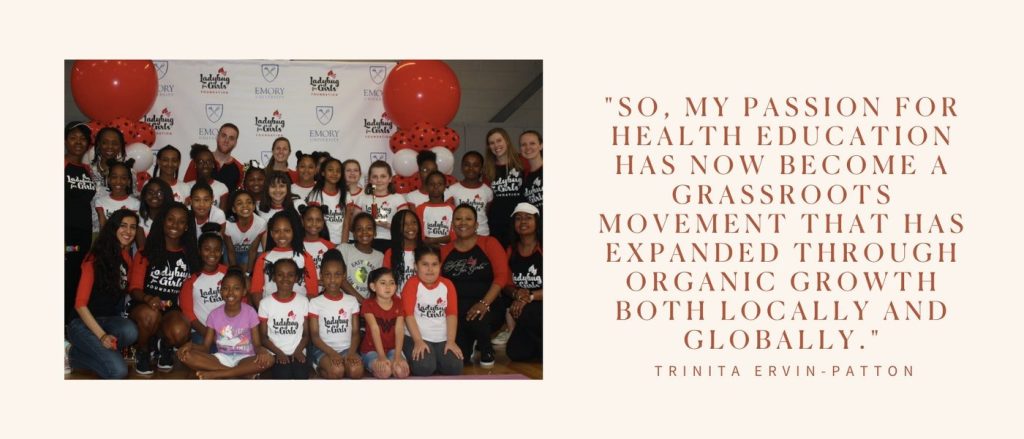
Today, our movement is inspiring girls to live healthier where they live, learn, and play. Our primary commitment is to ensure that young girls have the health resources and social-emotional tools to have an equal playing field in sports. I continue to help define and drive health education issues for girls through our charity the Ladybug for Girls Foundation, Inc. which has allowed us to expand our outreach globally to the world’s most marginalized populations in places such as India, Liberia, and now Kenya.
What does success look like to you and how are you breaking conventional ways of finding success for yourself?
I’d love to get to a place where we no longer have inequities within our healthcare system. Having good health or access to quality health resources shouldn’t depend on the color of your skin or the neighborhood that you live in. We are breaking through this issue by continuing to find innovative ways to make health education fun for all girls and by teaching parents in our virtual Ladybug for Girls community how to deal with difficult conversations with their daughters and by connecting them with health resources and support.
Specifically, how have others helped you in getting to where you are today? Looking back, what have been the most pivotal connections and collaborations?
I have been very fortunate to have several mentors and friendships that have led to unique opportunities.
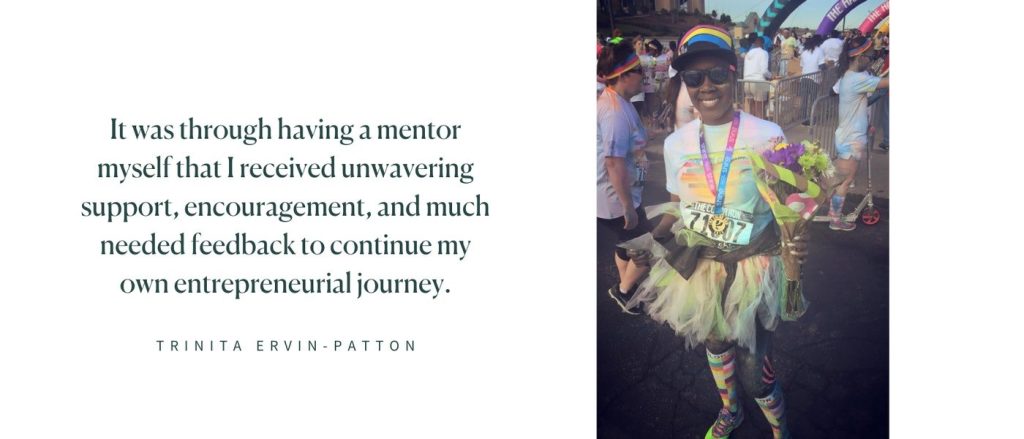
At the time that I started out in this space, it was a rather lonely path because no one was interested in this type of work. Although I faced many roadblocks and my messaging went on deaf ears in investor board rooms because health education for young girls was not a popular trend. My mentor, Vikki Millender-Morrow, encouraged me to be a bold, innovative pioneer and to leap into the unknown without the fear of failure. And she was right! Today, everyone is consumed with thinking about their health and with the latest focus on mental health awareness in athletes, thanks to tennis star Naomi Osaka and Olympian Simone Biles, girls’ emotional health is finally at the forefront of health and wellness conversations.
The most pivotal connection for me was working with Jeff Shinabarger while going through the Plywood Foundations process. Jeff and his team helped me learn how to build a team, manage our systems and operations, and he paired me with other mentors who were instrumental in helping us identify the right partners and resources for us to continue to grow.
How do you view mentorship and how has that evolved over the years? What insights can you share with other womxn around mentorship, either giving it or receiving it?
I think mentorship is critical. As I mentioned earlier, I have always had mentors to guide me along the way. The Lola has helped to match me with another phenomenal mentor, Sonya Ko. I desperately needed someone to mentor me in business finance. I had taken so many courses and completed a ton of business programs to achieve this. But it was through having Sonya as my mentor that I was able to get the 1-on-1 attention that I needed to realize that it wasn’t so much the concept of finance but understanding my personal relationship with money and my mindset as a woman. Sonya suggested the Money Mindset workshop with Michelle Waymire which was a game changer for me.
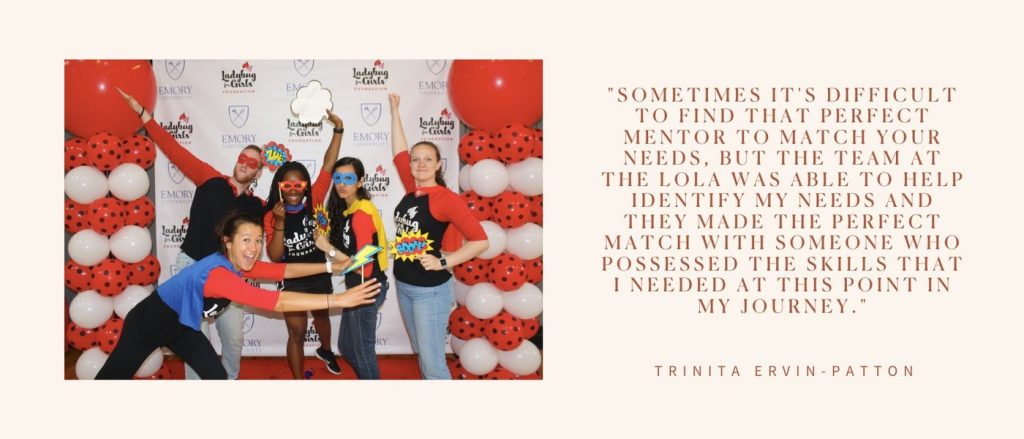
Over the past years, I have learned that if you’re fortunate to have someone willing to take the time to mentor you, value that person’s time and show up to meetings in a way that respects their time and skill sets while setting realistic expectations. I would say to womxn entrepreneurs that having a mentor in your life can be the difference between winning the day and giving up!
This has inspired me to become a mentor myself and pay it forward to future doctors in healthcare. The Ladybug for Girls Foundation has established a partnership with Emory University School of Medicine. This allows me to mentor first-year medical students. We help raise their awareness and understanding of the social determinants of health for underserved communities with an emphasis on improving health disparities.
What gaps in your networks would you like to fill and what are you looking for in potential role models in your current life/career stage? What would be helpful for you to see?
I think The Lola has been a great place for womxn to exchange ideas and collaborate in meaningful ways. I’m definitely open to networking opportunities to strengthen our presence and position amongst local sports and recreational leagues for athletic girls. And I’m always looking for ways to connect and collaborate with other womxn interested in health and wellness.

